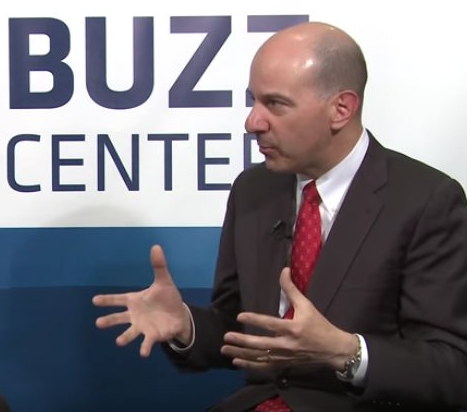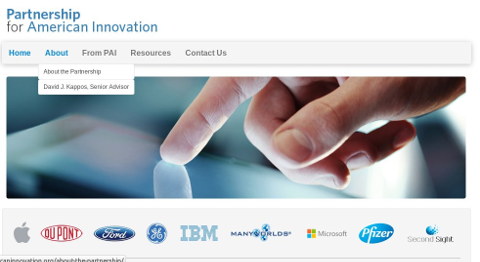 Source: David Kappos 2013 interview
Source: David Kappos 2013 interview

Kappos-led lobbying group
Summary: Mingorance, Kappos, Underweiser and other lobbyists for the software patents agenda (paid by firms like Microsoft and IBM) keep trying to undo progress, notably the bans on software patents
The patent trolls' (or sharks') lobby is at it again. Thankfully, owing to reports from their fan media and sometimes their own Web sites, we are able to see what they are up to.
Francisco Mingorance, a rather evil and deceitful person from Microsoft front groups like the BSA and now IP Europe, is trying to force software patents upon Europe using buzzwords like 5G and IoT. We
wrote about it last month. Found via
their tweet was
this press release which quotes Mingorance as saying: “We wholeheartedly welcome this signal from the DOJ that they will prioritise the safeguarding of longstanding FRAND principles against recent coordinated action of some implementers. In Europe, a decision to abandon this Communication – or to bring it back into line with its initially stated goals – can protect innovation, R&D investment, high-tech jobs and European leadership in 5G and IoT open standards.”
Nonsense. Exactly the
opposite is true, as actual practitioners in this area would gladly tell (if the media bothered asking them; it prefers to print lobbyists' words). These patent thickets actively suppress innovation and breed monopoly. Why isn't the mainstream media talking about it? The downside of patent lobbying and propaganda sites (like the above) is that they push agenda; the upside is, they inadvertently reveal who's behind it.
Days ago we found out that
David Kappos too is at it again. A bunch of patent bullies, including this
IBM-paid lobbyist and former IBM employee, were
lying to an audience. To quote the event's organisers: "Last #IPDF17 panel of day on patent quality Kappos, Judge Michel, John Mulgrew @Uber, Marian Underweiser @IBM & A. Fahrenkrog @RobinsKaplan" (stacked panel).
"At the #patent quality panel at #IPDF17,"
said another tweet, "Marian Underweiser @IBM points out that “the subject matter [ #Alice] discussion undercuts the purpose of the patent system.”"
Remember Marian Underweiser? IBM appointed her to crush
Alice. We wrote about her
several times earlier
this year and her agenda remains very clear; patent bully IBM has paid Underweiser for lobbying. Just like it pays Kappos for his connections and clout at the
USPTO. IBM is very evil when it comes to software patents.
Surprisingly even, especially considering the work it did for GNU/Linux.
Relaying messages from another event,
IAM quoted or paraphrased: "Shore - we're living in a banana republic. Silicon Valley owns Congress and the executive branch. The only difference between us and Honduras in early C20th is that instead of bananas it’s smartphones and software #IPDF17"
The law 'industry' wants to dominate everything, so when Silicon Valley warps the law in favour of technology Shore and others get upset. When
technology sets law it bothers the parasites. They're accustomed to making money by doing (or making) nothing.
A few days ago IAM again quoted Kappos. The patent trolls' lobby wants lots of lawsuits and it now mistakes pro-aggression for "pro-innovator". Here is
what IAM wrote:
Delrahim’s comments have already made an impact with senior members of the IP community. Former USPTO Director David Kappos, who was in the audience, described it as “the most important DOJ antitrust speech on IP during my decades practising law”. He added that: “It marks a major pro-IP and pro-innovator shift in DOJ antitrust policy.”
For the USPTO to improve its reputation it ought to ensure former officials don't become lobbyists (as they do). It's just embarrassing and it reinforces the perception that laws are up for sale.
Kappos is one among the alarmists who keep bringing up "China!" in order to scare legislators, urging them to act or else "China is coming" (similar to the "Russia!" hysteria in politics). China has become
litigation central (not
innovation central), which invites patent trolls rather than practising companies. What does the US want or need? More jobs or more lawsuits?
Days ago we saw
Managing IP hailing China (litigation) and IAM
spreading the myth that the success of Huawei is owing to patents rather than in spite of them. To quote IAM: "China is a crucial market for SEP owners – with a large amount of standards implementation and a litigation system that is becoming more favourable to patent holders – and that is borne out in the level of filing there. About 18% of global 4G-LTE patents are Chinese rights – putting the country second only to the United States and just ahead of the EPO."
See what we said above about Mingorance. These patents are
counter-productive and harmful to actual innovation. Moreover, China has developed some of its proprietary/national standards in several areas (technical domains). What causes a large surge in Chinese patents (at SIPO more so than overseas) is the lowered bar, which now officially permits software patents too. It makes China one of the few countries (if not
only country) in the world to move in such a direction.
Thailand, according to
this new overview from Ananda's Benjapol Kongsombut, does not allow software patents (similar to Korea and maybe even Japan to a lesser degree). "Computer programs or software cannot be patented under Sections 9," Kongsombut explains. Here is the entire relevant part:
To what extent can inventions covering software be patented?
Computer programs or software cannot be patented under Sections 9 and 65decies of the Patent Act. However, inventions relating to devices or machines controlled by software, or processes or algorithms for controlling devices or computers, may be patentable. Software-related inventions involving only computer source code cannot be patented but may be protected as a copyrighted literary work or a trade secret.
To what extent can inventions covering business methods be patented?
A business method cannot be patented as it is not considered to be an invention as defined in Section 3 of the Patent Act. However, a business method carried out by a computer can be considered as a software-related invention that may be patentable.
To what extent can inventions relating to stem cells be patented?
Stem cells are considered to be an animal extract, which is a non-patentable subject matter under Section 9 of the Patent Act. However, processes for the production or use of stem cells may be patentable.
What the likes of Mingorance, Kappos, and Underweiser are
paid to promote is software patents in the US. We already know why:
Alice and the Patent Trial and Appeal Board (PTAB), which we'll deal with in our next post.
⬆

 Source: David Kappos 2013 interview
Source: David Kappos 2013 interview
